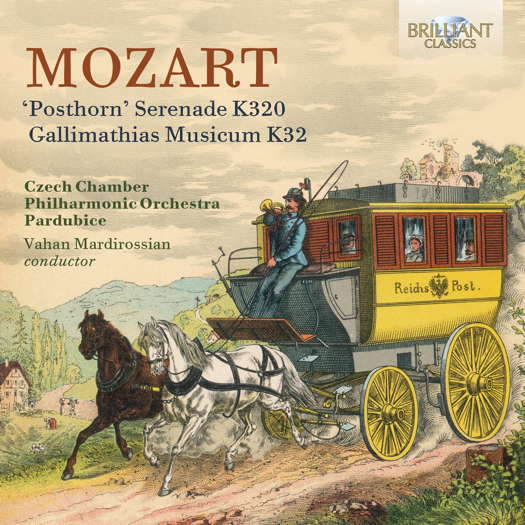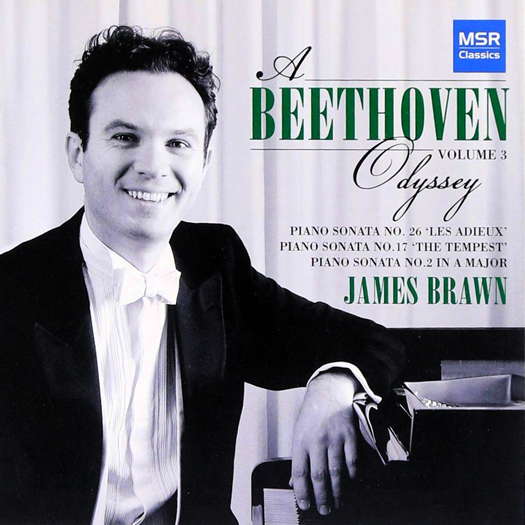- Asia
- Geoffrey Burgon
- Warner Music Italia Srl
- Benjamin Britten
- Louise Bessette
- Peter Gould
- Stefan Wojtas
- Alexander Gemignani

Three Surprises
GERALD FENECH recommends music by Mozart played by the Czech Chamber Philharmonic Orchestra Pardubice
'... a diverse survey of Mozart's occasional music in excellent sound quality and attractive presentation ...'
A substantial part of Mozart's oeuvre consists of works that may be called 'entertainment music'. Most of these pieces were composed for festive occasions in Salzburg such as name days, birthdays and other festivities. There are indications that a number of them were meant to be played out-of-doors, in a rustic garden setting with party guests enjoying a drink or a meal. Many of these easygoing works were labelled 'Divertimento', others 'Serenade', 'Cassation' or 'Notturno'.
Mozart's Posthorn Serenade, composed in 1779, is one of his best known and successful serenades. The name is derived from the prominent solo for posthorn, a valveless brass instrument used in postal services during the composer's time. Its five movements blend elegance with lively rhythms. From the graceful Andante to the spirited Menuetto, it abounds in melodic richness, charm, infectious brilliance and wit.
Listen — Mozart: Menuetto (Posthorn Serenade in D, K 320)
(97309 track 6, 0:00-0:28) ℗ 2024 Brilliant Classics :
Everything here is calculated to entertain, but beyond that there is a uniquely Mozartian pathos which emerges most strongly in the Andantino.
Listen — Mozart: Andantino No 1 (Posthorn Serenade in D, K 320)
(97309 track 5, 2:05-2:37) ℗ 2024 Brilliant Classics :
So far this music is the Mozart we know, but this exciting disc has three surprises in store that are really worth getting acquainted with. Little within Mozart's output could present a stronger contrast to the Posthorn Serenade than the patchwork of dances and tunes compiled by the ten-year-old composer while convalescing after a serious illness in The Hague. Commissioned to celebrate the accession of William V of Orange as Prince, this seventeen-movement work includes many sprightly and delightful moments that are surprisingly very well crafted for a ten-year-old.
Listen — Mozart: Molto allegro (Gallimathias Musicum K 32)
(97309 track 16, 1:37-2:15) ℗ 2024 Brilliant Classics :
No less interesting is the shift this programme makes from a frolicky Mozart to a more serious one in the form of the Masonic Funeral Music composed in memory of his Masonic brothers in 1785.
No less imposing in its way is the Fugue in C minor which Mozart originally wrote for two pianos in December 1783. Rescoring it for strings in June 1788, he added a stern and prefatory Adagio. Known as the Adagio and Fugue, K 546, this has been recorded by ensembles ranging from string quartet to full symphony orchestra, and many are very fine renditions. Still, the performance on this disc is especially commendable as the Czech Chamber Philharmonic Orchestra presents a compelling middle way.
Listen — Mozart: Fugue (Adagio and Fugue in C minor, K 546)
(97309 track 22, 2:57-3:50) ℗ 2024 Brilliant Classics :
Armenian conductor Vahan Mardirossian keeps things moving briskly, and his Czech players respond with light-hearted enthusiasm to the exquisite beauty of the music and, even when the occasion warrants, more 'gravitas' as in the Masonic Funeral Music where they rise to the occasion with exemplary flair.
Listen — Mozart: Maurerische Trauermusik, K 477
(97309 track 21, 4:42-5:20) ℗ 2024 Brilliant Classics :
This is a diverse survey of Mozart's occasional music in excellent sound quality and attractive presentation that should not be missed.
Copyright © 23 July 2024
Gerald Fenech,
Gzira, Malta





